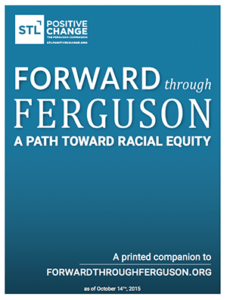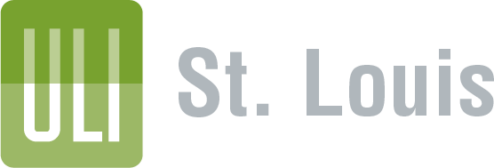Equitable Communities
ULI St. Louis seeks to inspire and encourage us all to make St. Louis a better place to live for people from all walks of life.

ULI St. Louis has been exploring ways in which our membership and the broader real estate community can play a role in implementing the Calls to Action found in the Ferguson Commission’s Report.
By poring over the Report and evaluating the 189 Calls, ULI has identified three Calls in which ULI can play an active role. Further, through conversations with local leadership, community organizations, Forward through Ferguson, and national ULI leadership, we have uncovered a path toward progress, a manner of assistance, and a broad network of community organizations, governmental and quasi-governmental entities and private companies that will help ULI St. Louis lead a coalition to act on three of the Ferguson Commission’s Calls to Action specifically tied to real estate development.
The goal: to present compelling information to the development community that prompts investment through a racial equity lens in our targeted areas.
The three Calls to Action are:
- Prioritize Transit-Oriented Development: Prioritize mixed-use, mixed-income, right-sized development near rail transit through changes in zoning, financial incentives for developers, and transit benefits for residents of developments. Prioritize developments for the underserved in the North and South St. Louis region.
- Build Healthy, Affordable Housing: Support the Missouri Housing Development Commission’s QAP as it references unit sizes, investment of LIHTC, and workforce housing namely with respect to: limiting applications to 50 units; prohibiting affordable housing in census tracts where more than 20% of housing is subsidized; prohibiting affordable housing within one mile of other subsidized housing; prioritizing service-enriched housing.
- Subsidize Middle-Market Neighborhoods: Develop a regional strategy that actively attempts to stabilize middle-market neighborhoods and that emphasizes the health and well-being of existing residents (e.g. Baltimore’s Healthy Neighborhoods program).
Core beliefs:
- We must encourage increased investment in and focus on areas of potential by the development community that promote racial equity.
- We must ensure that, when ULI is able to deploy local and national resources and expertise, there is buy-in with and accountability to the affected communities.
- We must conduct a parallel process with the development community to insure that the progress we are proposing and/or making is viable and actionable.
- We must develop our strategy in the context of potential funding sources, to increase the likelihood that a project is built.
- We must seek to learn from nature as teacher to leverage the genius of place – tight feedback loops, inclusionary characteristics, and resiliency – to help us understand what is right for a place.
- We must identify ways in which investment messages/stories can be shared with local and national media to better shape the narrative around these areas.
Deliverables:
- Asset map – A multi-layered geographic map identifying key data drivers for real estate investment decisions. Contact Chip Crawford, Equitable Communities Chair, to learn more.
- Ecosystem map – A single graphic representation of the organizations, companies, individuals, and governmental entities who have the power to impact or implement this community development work. Contact Kacey Cordes, Equitable Communities Co-Chair, to provide feedback on the working draft.
- Technical Assistance Program – A one-day work session during which panelists study a development challenge and issue a set of recommendations, conducted with the goal of producing at least one tangible project in the target areas. Contact Kelly Annis to learn more.
- Real Estate Diversity Initiative (REDI) – A comprehensive, 15-session curriculum designed to advance the real estate careers of professionals of color and women by teaching real estate development in the classroom and through group mentoring around a live project. Contact Andrew Bradley to learn more.
- UrbanPlan – A realistic, engaging, and academically demanding curriculum in which students or community leaders learn about the fundamental forces that affect real estate development. Contact Adam Stroud, UrbanPlan Committee Chair, to learn about volunteering.
